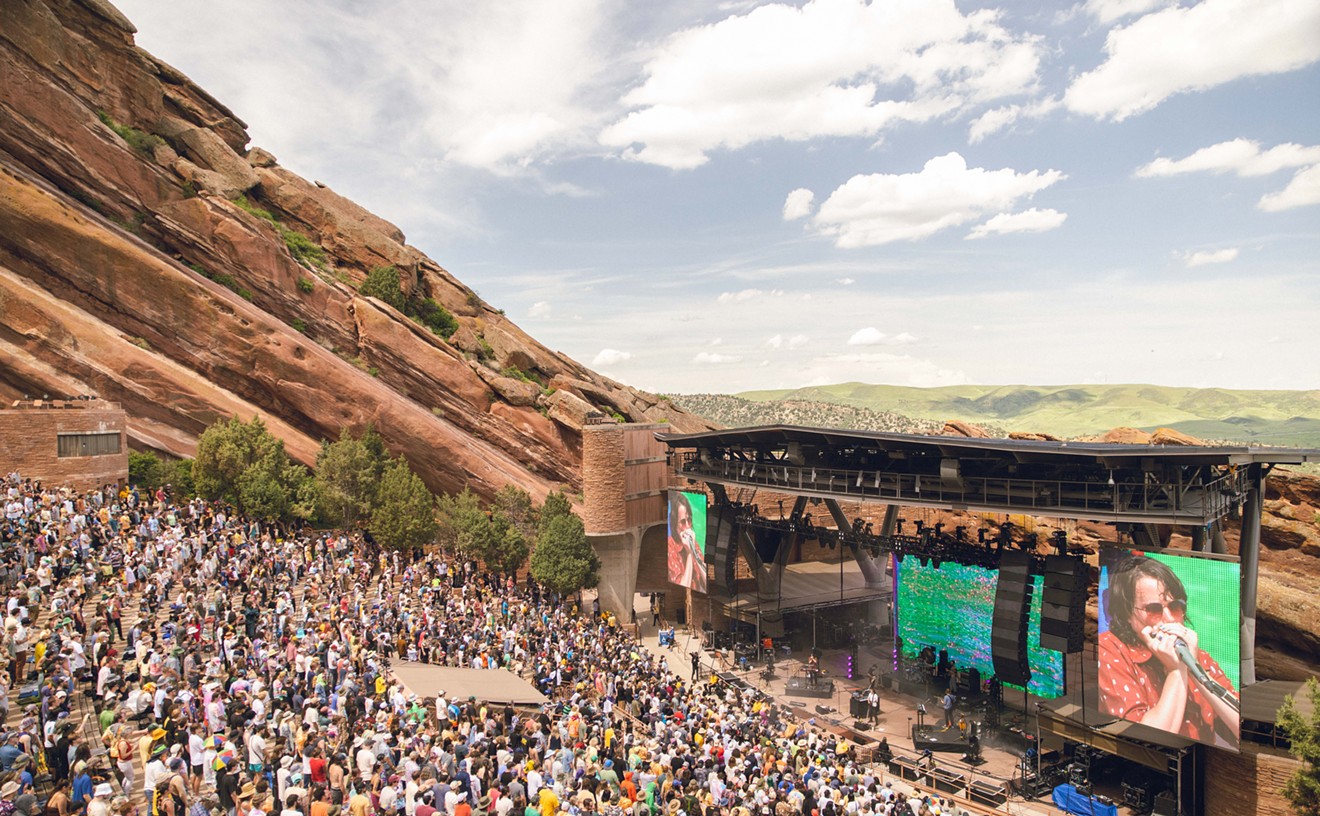The Lumineers blasted into stardom with the earworm “Ho Hey” on the act’s 2012 self-titled debut full-length. The indie-folk rockers were armed with catchy, stripped-down songs and a marketable story about how in 2009, founders Wesley Schultz and Jeremiah Fraites ditched prestigious New York City for Denver, which was then a cheap cowtown — at least that’s how their story goes.
They weren’t rich kids and couldn’t afford the trust-fund paradise of Brooklyn, so Denver became their launching pad. Theirs is a classic Horace Greeley go-West-young-man story, and their aura of bootstrapping earnestness still defines them. Schultz and Fraites and their band breathed hope into the notion that the Mile High City could become a music hub.
Now on a break from a tour supporting their sophomore Billboard chart-topping Cleopatra album, Schultz sits at a long table at the Denver Bicycle Cafe, between a group of longtime bike activists and his entrepreneurial wife, Brandy. All these years later, he’s still griping about the Big Apple.
“There was just a lot of bullshit, where there were kids who’d say they were in eight bands, and I’d be bartending or a barista, and I’d be like, ‘When do you work? How does this work?’” recalls Schultz. “Like, ‘I can barely afford rent, and you’re in how many bands?’ I can barely be in one band and survive.”
So he and Fraites, his bandmate of four years, set out for Colorado. At higher elevation and with lower rent, the two spent their time writing and recording rather than slinging lattes to pay bills.
In Denver, Schultz found a job at Den Deli, where Ototo now sits, on South Pearl Street. After the Lumineers released an inaugural EP, Westword wrote a review. “Someone brought me the Westword, and I was like, ‘We’re fucking in the Westword,’” he recalls. “That meant a lot to me, to have someone just mention it.” Garnering press attention would have never come so quickly in the Village Voice, he adds.
Every Tuesday in Denver, Schultz and Fraites would lug their instruments to the Meadowlark, where they honed their chops playing the once legendary open-mic night, back before RiNo was RiNo — when you could still find a parking spot, Joe’s Liquors wasn’t under the gun, and the “culinary emporium” Denver Central Market hadn’t turned Larimer into a shopping mecca of all things artisan and boutique.
Back then, the only indication that the neighborhood was about to gentrify might have been that the Meadowlark and the Larimer Lounge were providing wannabe entrepreneurs with cozy spots to drink and hatch schemes. But even the singer-songwriters showing up on Tuesdays — including the Lumineers — never saw the wealthy transplants coming.
Schultz describes his first years in Denver as a special time. He remembers playing a house show back when he was too broke to get drunk. The guy who owned the place, nicknamed Bougie Steve, had bought sixty bottles of wine for the crowd.
“The party went right through it in three hours,” Schultz recalls, “because we were coming from a place of scarcity. Like, ‘Fuck, this wine’s almost gone, so we’d better drink it.’”
He met Brandy, whom he married in 2014, at that party. As the Lumineers went pro, Brandy knew they needed money, so she decided to launch her own business. She emailed the CEOs of major corporations, advertising a high-end adventure daycare business. Clients bit, and now her six-figure nannies work for some of the biggest names in Silicon Valley. When the Lumineers started touring (but brought in little in the way of money), Brandy’s income floated the couple, she says.
Her work and Schultz’s eventual success allowed them to maintain a home base in Denver — even as local artists have been pushed out and transplant musicians have flooded the scene, many inspired by the Lumineers’ story.
When asked about changes in Denver, Schultz says he wouldn’t really know, as he’s been touring nonstop. And these days, the cost of living doesn’t matter much for the act, which has cashed in on its foot-stomping songs, selling out headlining shows at Madison Square Garden and opening for the likes of Tom Petty and U2.
Still, Denver has become his home. And this week, the Lumineers are back to play three nights at the 18,000-capacity Fiddler’s Green — a homecoming to celebrate the end of the band’s Cleopatra tour that has taken it to arenas around the world.
Three nights in one town is a lot of time to fill for an outfit with just two records. But Schultz doesn’t mind repeating material night after night — not if it pleases the crowd. His goal, whether he’s busking on a street corner, playing a house show (neither of which he does that often anymore) or opening for U2, is to win over newcomers, not just die-hard fans. To do so, the act sticks to its best material.
“If you don’t make that impact with people that night, you don’t ever get a second chance,” he says. “Sometimes that means you play the same set for weeks, and you have to accept that.”
Luckily, the Lumineers catalogue is strong. Schultz, who describes himself first as a writer and then as a performer, says the bandmembers trash roughly 80 percent of their output, filtering out bad material. They use some songs as “sacrificial lambs,” taking a hook from one, a bridge from another and a verse from a third and mixing them into something Schultz and Fraites are proud of.
Unlike songwriters who hole up from the world while working, Schultz solicits input from others. Simon Felice of the Felice Brothers has two writing credits on Cleopatra, because while he was producing the album, he offered up lyrics that Shultz says bested his own.
“There is a callousness to writing that I kind of appreciate, and it’s that there is no sentimental quality to it,” Schultz says. “May the best idea win. May the best musical idea win. May the best lyric win. And it doesn’t matter who it comes from in the room.”
That said, he won’t invite just anybody into that room. He only brings in those he trusts, and there is nobody he trusts more than Fraites. The two are in a virtual common-law marriage that neither wants to leave, Schultz says. He depends on Fraites for his multi-instrumental musical acumen; Fraites leans on Schultz for his ability to write lyrics and sing.
Schultz originally wrote from home; now he also does so on the road. When the bandmates started bringing in disposable income, they invested in a Transformer-like gear case that unfolds into a mobile recording studio. Crew members would set up the instruments and the rig, and in theory, the musicians would walk into the portable studio and write.
The trouble was that it felt artificial. So they traded in their fancy gear case and now stick to Schultz’s iPhone, which has simplified the process.
His phone archives dozens of musical and lyrical ideas with cryptic names like “Verona Lullaby” and “Zurich Radio,” titles that hint at songs that may be the act’s next big hit or may die before we ever hear them.
It’s those and the early EP that the band will mine for its next album, which it will begin writing and recording properly once the Fiddler’s Green shows have wrapped.
Schultz and Fraites will develop the material in part at a rural sanctuary they’re sharing with some of the Felice Brothers in the Catskill Mountains, but also in Denver, a city Schultz hopes will take the plight of artists seriously. After all, it’s the creatives who make Denver what it is and what he loves about it.
“Look at RiNo,” Schultz says. “That’s what it is because of artists coming in and making a coffee shop or making a bar or making a restaurant or making a venue. There’s all this beauty to it. But I remember playing the Meadowlark, and that was a shady place. You’d go get some cigarettes down at the bodega, and now it’s Denver Central Market. It’s the most beautiful place in Denver. It’s crazy how much that has changed.
“It reminds me of how I heard stories about Nashville,” he adds. “It’s not like you wanted to be in danger, but you appreciated the fact that the city had an edge to it, and it had an identity that you weren’t uprooting, you know?”
The Lumineers
August 25-27, Fiddler’s Green Amphitheatre, 6350 Greenwood Plaza Boulevard, Englewood, $29.95-$65, 303-220-7000.
[
{
"name": "Air - MediumRectangle - Inline Content - Mobile Display Size",
"component": "12017618",
"insertPoint": "2",
"requiredCountToDisplay": "2"
},{
"name": "Editor Picks",
"component": "17242653",
"insertPoint": "4",
"requiredCountToDisplay": "1"
},{
"name": "Inline Links",
"component": "18838239",
"insertPoint": "8th",
"startingPoint": 8,
"requiredCountToDisplay": "7",
"maxInsertions": 25
},{
"name": "Air - MediumRectangle - Combo - Inline Content",
"component": "17261320",
"insertPoint": "8th",
"startingPoint": 8,
"requiredCountToDisplay": "7",
"maxInsertions": 25
},{
"name": "Inline Links",
"component": "18838239",
"insertPoint": "8th",
"startingPoint": 12,
"requiredCountToDisplay": "11",
"maxInsertions": 25
},{
"name": "Air - Leaderboard Tower - Combo - Inline Content",
"component": "17261321",
"insertPoint": "8th",
"startingPoint": 12,
"requiredCountToDisplay": "11",
"maxInsertions": 25
}
]












